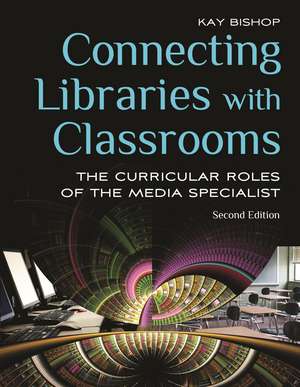Connecting Libraries with Classrooms: The Curricular Roles of the Media Specialist
Autor Kay Bishopen Limba Engleză Paperback – 8 mar 2011 – vârsta până la 17 ani
Preț: 258.42 lei
Preț vechi: 376.92 lei
-31% Nou
Puncte Express: 388
Preț estimativ în valută:
49.46€ • 51.44$ • 40.83£
49.46€ • 51.44$ • 40.83£
Carte tipărită la comandă
Livrare economică 14-28 aprilie
Preluare comenzi: 021 569.72.76
Specificații
ISBN-13: 9781598845990
ISBN-10: 1598845993
Pagini: 140
Dimensiuni: 216 x 279 x 13 mm
Greutate: 0.41 kg
Ediția:Revizuită
Editura: Bloomsbury Publishing
Colecția Linworth
Locul publicării:New York, United States
ISBN-10: 1598845993
Pagini: 140
Dimensiuni: 216 x 279 x 13 mm
Greutate: 0.41 kg
Ediția:Revizuită
Editura: Bloomsbury Publishing
Colecția Linworth
Locul publicării:New York, United States
Caracteristici
A bibliography provides recommended resources in three chapters: students with autism, highly mobile students, and LGBT students
Notă biografică
Kay Bishop was associate professor of library and information studies at the University of Buffalo, Buffalo, NY.
Cuprins
About the AuthorAcknowledgmentsAuthor's NoteIntroductionChapter 1 Collaboration and PartnershipsCollaborationAuthentic Learning and ConstructivismInquiry-Based LearningConnecting the School Library to the CurriculumInformation LiteracyPartnershipsInstructional Partner with TeachersPrincipalStudentsThe CommunityConclusionsReferencesSuggested ActivitiesSubject Areas and the Media SpecialistChapter 2 Reading in the Elementary SchoolStandards and AssessmentsReading and NCLBTest ResultsResponse to InterventionResearchThe Role of the School LibrarianAASL and ReadingContributions to School-Wide LiteracyProfessional LibraryConclusionsReferencesSuggested ActivitiesChapter 3 Music in the Middle SchoolStandards and AssessmentsMusic Education and NCLBResearchThe Role of the School LibrarianCollaborative ActivitiesMusic and CopyrightConclusionsReferencesSuggested ActivitiesChapter 4 English as a Second Language in the High SchoolEducational ChallengesStandards and AssessmentsTeaching English as a Second LanguageELLs in Mainstream or Inclusive ClassroomsThe Role of the School LibrarianLiteratureTechnologyConclusionsReferencesSuggested ActivitiesLearning More about Subject AreasSpecial Groups of Students and the School LibrarianChapter 5 Students Who Are AutisticLegislationEducational ProgrammingIndividualized Educational PlansInclusionOrganizations and PublicationsThe Role of the School LibrarianInstructional StrategiesHelpful ResourcesTeacher and Parent Resource CollectionsBooks for StudentsConclusionsReferencesSuggested ActivitiesChapter 6 Highly Mobile StudentsLegislationImpact of Student MobilitySchool EffortsThe Role of the School LibrarianHelpful ResourcesHomelessMigrant and ImmigrantsFoster Children and OrphansMilitaryCollaborating with OthersConclusionsReferencesSuggested ActivitiesChapter 7 Students with Gay, Lesbian, Bisexual, or Transgender OrientationsDefinitionsLegislationLGBT Issues in the CurriculumOrganizations and PublicationsThe Role of the School LibrarianSupporting LGBT StudentsLiteratureConclusionsReferencesSuggested ActivitiesLearning More about Special Groups of StudentsEducational Trends and the School LibrarianChapter 8 Web 2.0ControversyBarriersBenefitsTeaching with Web 2.0The Role of the School LibrarianStudent Online SafetyProfessional DevelopmentConclusionsReferencesSuggested ActivitiesChapter 9 Distance EducationDefinitionsControversyBenefitsChallengesResearch StudiesThe Role of the School LibrarianConclusionsReferencesSuggested ActivitiesChapter 10 InclusionFederal LegislationControversyOpponents of InclusionProponents of InclusionRecommendations for Implementing InclusionThe Role of the School LibrarianPhysical Facility ConsiderationsCollaboration with Special Education and Classroom TeachersAssistive TechnologyConclusionsReferencesSuggested ActivitiesLearning More about Educational TrendsAppendix: BibliographyIndex
Recenzii
This material will be a welcome addition to the Library Media Specialist's arsenal of resources to stay current and involved. I would suggest that this title sit beside you on your desk for quick reference.
Connecting Libraries with Classrooms is an invaluable resource for any education or library leader who wants to work to greater artistic literacy for their patrons and students.
An excellent resource for school librarians in training. . . . Connecting Libraries with Classrooms is a useful book to have in the Teacher Reference section of the the school library.
Connecting Libraries with Classrooms is an invaluable resource for any education or library leader who wants to work to greater artistic literacy for their patrons and students.
An excellent resource for school librarians in training. . . . Connecting Libraries with Classrooms is a useful book to have in the Teacher Reference section of the the school library.




